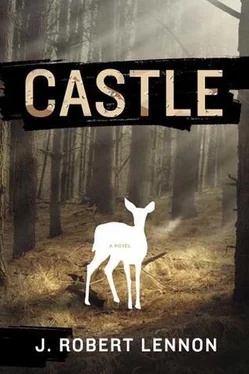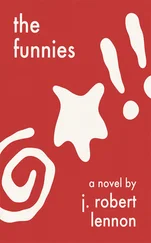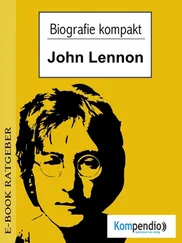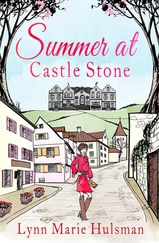But Professor Stiles was shaking his head. “No, Eric. You need to understand the real reason you’re here. Not simply to these woods. Home. Why did you come back to Gerrysburg?”
“That’s none of your concern,” I managed. I could no longer lift my head to see him.
“Where did you live before this, Eric? Why did you leave the place you were before?”
“That’s … ” I muttered. “You …” But I could no longer speak, my exhaustion was so profound. Tears gathered in my eyes and rolled down the sides of my head.
Before I fell unconscious, I saw him get up and walk away.
I believe that my first visit to him was in his office at the college. Not the building where I encountered Professor Lydia Bulgakov — a different, older, smaller structure that, as far as I know, is no longer even standing. I recall that the room was taller than it was wide, with windows that stretched floor to ceiling and looked out upon a tree-covered hill that rose up and out of sight. It was my father, of course, who delivered me there, and I remember that he was uncharacteristically subdued, as if in awe. I had, as I’ve described, seen him indulge in some chummy banter with people in the past, and had known him to brood, or to explode into anger. But I had never seen this state — one of muted respect. Of course I followed suit.
Professor Stiles sat at a large wooden desk that took up a full quarter of the room, its veneer bubbled and peeling and thick with dust. He peered out at us through a canyon formed by a dozen high piles of heavy books, each appearing likely to fall at any moment. His smile when he saw us was wide and humorless and accompanied by a simple nod of acknowledgment.
“Eric,” my father said quietly, “sit down.” And he pointed to an arrangement of two chairs that stood in a bookcase-lined corner of the room. One was simple and wooden and appeared uncomfortable; the other was large, and thickly upholstered with worn leather. I chose the leather chair, of course, and slid onto it, tipping my head back to examine the incomprehensible titles on the spines of the Professor’s books.
My father spoke quietly to Professor Stiles about when he ought to return for me, and a moment later he caught my attention at the door. He said goodbye and told me he would be back soon, and I thought I detected a momentary expression of worry on his heavy, rather tired-looking face. I nodded, he nodded, and he was gone, the heavy door falling shut behind him.
With the door closed, the silence in the room was total. In spite of the windows, it seemed entirely cut off from the outside world. I stared at the door for a moment — a curled and yellow poster on the back bore an etching of some spear-bearing warrior at the wall of a city, a dead man crumpled at his feet.
I then noticed a marked change in the air of the office.
Professor Stiles had stood up behind the desk, and he stared at me now, over the towers of books, with something that appeared to me like hatred. His hair, thin even then, stood up in mad black spikes, and his face glowed faintly with some obscure emotion. I cringed, sinking back into the leather chair.
A few scant seconds later, and with nothing but two long steps, he had crossed the room and struck me, open-handed, across the face.
I was too stunned to cry out, too frightened to move. Professor Stiles leaned over me like a great bird or dinosaur, his deep brown eyes drilling into mine, and snarled, “What are you doing ”
Surely there was a correct answer. I stammered. “I … I …”
“Get off that chair.”
I jumped down without hesitation. My legs trembled; the floorboards creaked beneath my feet. The Professor grabbed me by the shoulders and pushed me down into the other chair, the wooden one, which was spattered with paint and squeaked and leaned under my negligible weight.
“In this office,” he said with quiet and terrifying intensity, “you do precisely what you are told to do, and nothing more. Did I tell you to sit down?”
“No,” I whispered.
“Then why did you sit down, Eric?”
The answer, of course, was that my father had told me to. But it was clear that my father held no sway here, not now, not ever, and that, for the foreseeable future — an hour, but an eternity to me — I would answer entirely to the authority of Professor Stiles. I said, “I… I don ’t know.”
“In this room,” he said, straightening, “you do everything for a reason. And that reason is that I told you to do it. Do you understand me?”
“Yes.”
“Excellent.” And with that word, he seemed suddenly to soften. His shoulders relaxed, the creases in his face smoothed out, and his hands found the pockets of his slacks. Beneath the fabric, his bony fingers danced and twitched. “So!” he said, with a smile. “Would you like something to eat?”
Lunch, in fact, was more than an hour away, and I was indeed quite hungry. Still cowed, I merely nodded to indicate my desire.
The Professor strode out the door, and returned a minute later carrying a small china plate. On it lay a fork and a square of frosted cake. “Our department secretary, Mrs. Choate, had a birthday today,” he explained. “We celebrated with a bit of cake!” He handed the plate to me, then settled into the leather chair with a satisfied sigh. I forked off a small piece of the cake, and put it in my mouth.
I’d barely had time to taste it when the Professor leaped from his chair, lunged across the space between us, and again struck me on the face, this time knocking the cake from my mouth and the plate and fork from my hands. He had hit me harder this time, and a bloom of dull pain spread through my jaw. I was unable to restrain myself from crying.
“Did I tell you to eat the cake” he hissed, his face up close to mine, his dank breath in my nose.
“No!” I blubbered.
“Did I not tell you to do nothing that you are not told to do”
“N — Yes!”
He raised his hand again. I cowered. The hard wooden seat was hurting my behind, and my jaw throbbed. “Did I tell you, Eric,” the Professor growled, “to cry?”
“N-no, sir.”
“Did I tell you to cringe ”
“No, sir.” I began to straighten, then abruptly stopped. The Professor smirked.
“Very good,” he said. “You may sit up straight.”
I obeyed, moving slowly, willing my body to stop shaking. My mind raced — just how precisely, I wondered, must this rule be observed? Would I be punished for sneezing, for twitching? For drawing breath? Would I be slapped if my eyes strayed too far to one side? If I crossed my legs, licked my lips? My face must have been a mask of terror and calculation, and the Professor studied it carefully, eventually drawing back, settling into his chair, and nodding with evident satisfaction.
“Very good,” he said again. “You’re attempting to determine the parameters of the rule, aren’t you? You may answer.”
“Yes, sir.”
“Be assured, Eric, that you may continue to breathe. Should you feel ill, or need to use the toilet, you are permitted to raise your hand and inform me. You are never to speak without being asked a question. You are never to answer a question with more information than was requested. Do you understand?”
“Yes.” I opened my mouth to add, “I think,” but restrained myself. For having done so I was able to feel a very small amount of pride.
For some time I would despise Doctor Stiles. In fact, I took the risky step of telling my mother this, though I didn’t dare tell her what had gone on at that first meeting. I realized my mistake almost immediately, as my mother leaned close — we sat at the dining room table, me doing my mathematics homework, she her mending — and whispered, with desperate intensity, “What happened, Eric?”
Читать дальше











